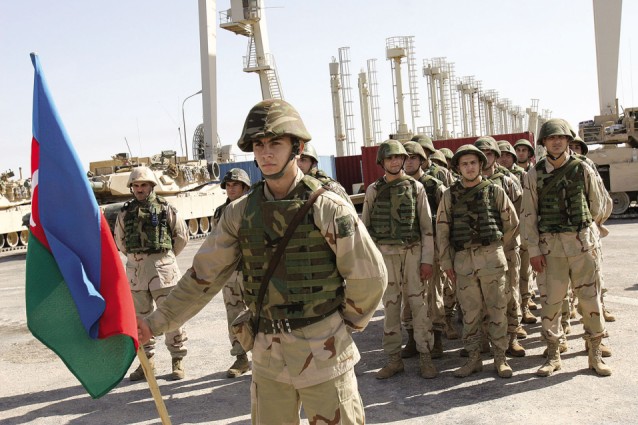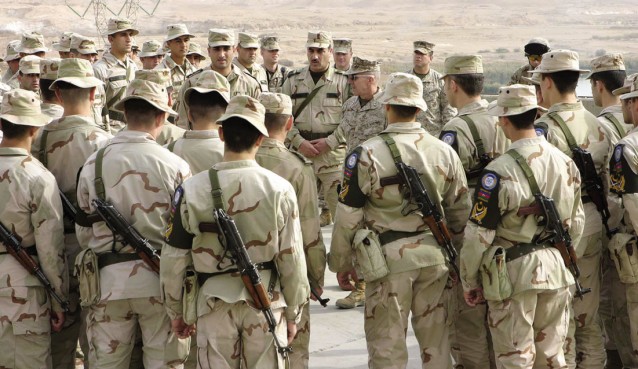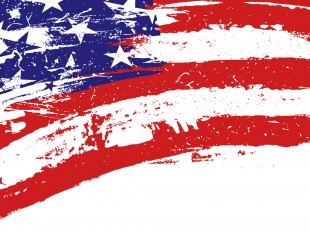Azerbaijan is an important, if often overlooked, country in regard to many of the challenges the US faces around the world. Washington DC and Baku share many common challenges such as a resurgent Russia, an emboldened Iran, wavering allies, growing China, and the rise of Islamic extremism. Closer cooperation and partnership between the two countries would benefit both.
Azerbaijan sits at a crucial geographical and cultural crossroads linking Europe and Asia and has proven strategically important for military and economic reasons for centuries. This is a fact of which many US policymakers seem oblivious. In recent times the US has chosen to largely disengage from Azerbaijan and the South Caucasus and Caspian regions but this has not always been the case.
 President Ilham Aliyev of Azerbaijan meets U.S. President Barack Obama at the UN General Assembly
President Ilham Aliyev of Azerbaijan meets U.S. President Barack Obama at the UN General Assembly
A long relationship
US-Azerbaijani relations date back to the Paris Peace Conference after World War One during the early and short-lived days of the Azerbaijan Democratic Republic. Alimardan Topchubashov, the republic’s foreign minister, was stuck in Istanbul waiting for the French to issue visas for him and his delegation to travel to Paris to make the case for an independent Azerbaijan in front of the victors of World War One.
Days turned into weeks, and weeks turned into months, but visas were not forthcoming. Finally, US Secretary of State Robert Lansing wrote to his French counterpart, Stéphen Pichon, asking for help getting the Azerbaijani delegation visas. After three months of waiting Topchubashov and his delegation finally made it to Paris, met with US President Woodrow Wilson, and won de facto recognition of the Azerbaijan Democratic Republic. Sadly, the new republic was short-lived. Months later the Red Army invaded and occupied Azerbaijan and absorbed it into the Soviet Union.
A few years after meeting with the Azerbaijani delegation President Wilson recounted the event during a speech delivered in San Francisco:
Well, one day there came in a very dignified and interesting group of gentlemen who were from Azerbaijan… I was talking to men who talked the same language that I did in respect of ideas, in respect of conceptions of liberty, in respect of conceptions of right and justice.
His views should come as no surprise. After all, women received the right to vote in Azerbaijan almost two years before their American counterparts.
During the Cold War and the Soviet occupation of Azerbaijan the US and the Azerbaijan SSR did not, and of course could not, have formal diplomatic relations. However, on the break-up of the Soviet Union the then US President George H.W. Bush recognized the reestablishment of Azerbaijan’s independence on Christmas Day, 25 December 1991.
Regrettably, by the late 1990s, the US lost much of its enthusiasm for engaging with the newly independent countries of the former Soviet Union, including Azerbaijan. This all changed immediately after the 9/11 terrorist attacks. Soon after, the US sought to reengage with the region to seek cooperation against international terrorism and to secure transit and basing rights in the Caucasus and Central Asia for combat operations in Afghanistan. Azerbaijan in particular was an important focus for the US during this time.
Azerbaijan stepped up to the challenge working very closely with the US in the war against international terrorism. Not only was Azerbaijan a willing partner for the US, it also sent troops to fight in Iraq and Afghanistan—some of whom were even awarded medals by the US military.
Baku also opened important transit routes to the US and NATO. At its peak roughly one-quarter of US and NATO supplies and equipment for the Afghan operation passed through Azerbaijan and Georgia. During this same period more than 100,000 international coalition troops transited Azerbaijan’s airspace en route to Afghanistan.
A transactional relationship
In addition to Baku’s support for the mission in Afghanistan, Azerbaijan is also an important US partner for a number of other reasons. Although Azerbaijan is a Muslim-majority country, it is a very secular society. Azerbaijan has a very close relationship with Israel and Turkey and views Iran with distrust and suspicion. This aligns Azerbaijani foreign policy with America’s.
Azerbaijan is part of NATO’s Partnership for Peace programme and participates in NATO training exercises and officer exchanges. Although Azerbaijan is not actively seeking to join NATO, it participates in NATO-led missions and has close relations with other NATO members and partners, including Turkey and Georgia.
Although US–Azerbaijani relations were probably at their closest soon after the 9/11 attacks three recent events have dampened relations. First was the perceived lackluster US response to Russia’s 2008 invasion of Georgia. After the invasion, policymakers in Baku started to question American power and influence in the region—and rightfully so.
Second was the Western response to Russia’s invasion and annexation of Crimea and eastern Ukraine has further made Baku question the value of its engagement with the West. Both events, in Georgia and Ukraine, made the US and the West look weak in a part of the world where strength and power are respected.
Finally, the US drawdown in Afghanistan and the subsequent disengagement from Azerbaijan and the region has led many in Baku to question the transactional nature of the US-Azerbaijani relationship. A feeling exists in Baku that the US got what it wanted for the war in Afghanistan, and now it no longer needs Azerbaijan as a partner. After the 9/11 attacks Azerbaijan was looking for a long-term relationship with America, once the troop drawdown from Afghanistan began and the US pulled back from the region, it became clear that the US was not as interested in building an enduring relationship as it once was.
The transactional nature of America’s relationship with Azerbaijan was shortsighted for two reasons: First, it created the perception in Baku that as soon as the US got what it wanted it would move on. Secondly, it has diminished any good will that the US created in the broader region, and regaining trust here will prove even more difficult. Considering how important Azerbaijan is to a broader US strategy dealing with Russia and Iran, this will have negative consequences for US policy in the future.
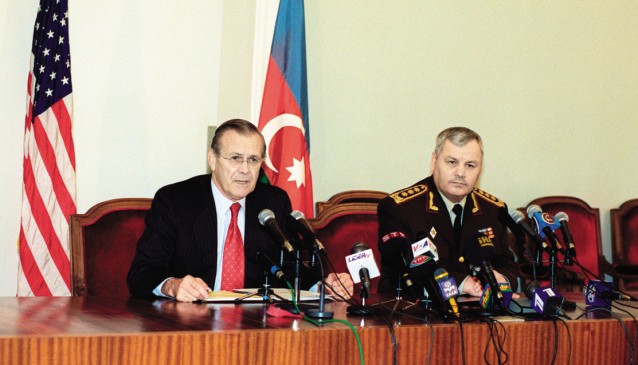 Former US Secretary of Defense Donald Rumsfeld with former Azerbaijani Minister of Defense Safar Abiyev at a press conference in Baku in December 2001
Former US Secretary of Defense Donald Rumsfeld with former Azerbaijani Minister of Defense Safar Abiyev at a press conference in Baku in December 2001
A lopsided policy
Today, the US-Azerbaijani relationship is perhaps the most acute example of declining American influence in the region. It is also an example of a lopsided foreign policy pursued by Washington DC utterly counter to US interests.
Rightly or wrongly, there is a feeling in Baku that Azerbaijan is singled out for sustained criticism by the West over human rights issues - mainly by Europe, but also by the US - in contrast to the almost complete silence which greets the activities of China and Saudi Arabia.
A feeling exists in Baku that the US got what it wanted for the war in Afghanistan, and now IT no longer needs Azerbaijan as a partner
US engagement with Azerbaijan needs to take a multifaceted approach that involves energy, security, human rights, and geopolitical concerns. One issue alone, such as human rights, should not trump other aspects of US-Azerbaijani relations. It seems that lately this has been the case and now the US-Azerbaijani relationship is suffering.
Another major problem for the relationship that needs to be fixed dates back to 1992 when Congress passed Section 907 of the Freedom Support Act as a result of the influential Armenian lobby in Washington DC. In sum, Section 907 prevents the US from providing military aid to Azerbaijan and identifies Azerbaijan as the aggressor in its war with Armenia.
This latter point is curious considering that Armenia is occupying almost 20 per cent of the territory recognized by the international community as being part of Azerbaijan and that more than 620,000 Azerbaijanis are currently classified as internally displaced people (IDP) as a result of the war in the early 1990s. I have met some of these IDP settlements around Baku and hearing the stories of those who have lost their home, property and in many cases, loved-ones is heartbreaking.
After the attacks of 9/11, the George W. Bush Administration recognized the important role that Azerbaijan would play in the campaign in Afghanistan (and later Iraq) and annually waived Article 907 so it did not apply. Thankfully, for many of the same reasons as the Bush Administration, the Obama Administration continues to waive Section 907. Azerbaijan is the only former Soviet Republic that has restrictions placed on it like Section 907. Even the most casual observer can see that the origins of Section 907 were politically motivated by certain lobby groups and not connected to larger US strategy or goals in the region.
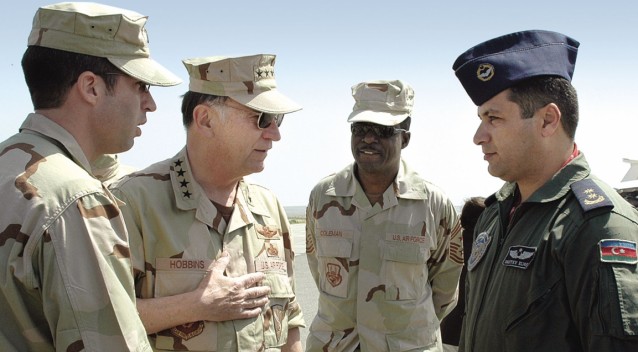 Gen. Tom Hobbins, U.S. Air Forces in Europe commander, and Chief Master Sgt. Gary Coleman, USAFE command chief, are greeted by Lt. Col. Elmar Huseynov, Azerbaijani Air Force, during a visit to Nasosnaya Air Base, Azerbaijan, in May 2006
Gen. Tom Hobbins, U.S. Air Forces in Europe commander, and Chief Master Sgt. Gary Coleman, USAFE command chief, are greeted by Lt. Col. Elmar Huseynov, Azerbaijani Air Force, during a visit to Nasosnaya Air Base, Azerbaijan, in May 2006
It’s time for more US engagement
As a developing democracy there might be some human rights concerns in Azerbaijan, but in the long run only US engagement, not constant criticism, will keep Baku on the path toward good governance. Democratization is a process, and not a single event. Even a cursory look at America’s own history is proof of this.
The US needs to develop a strategy for engagement with Azerbaijan that promotes friendship and mutual respect, economic prosperity, the wise use of energy resources, and is aware of the consequences of increased Russian, Iranian, and Chinese influence in the region.
There is a lot the US can do to help Azerbaijan while simultaneously advancing US interests in the region. If done correctly, US engagement can be a win-win situation for all.
US reengagement could begin easily and symbolically with just a few high-level visits by US officials. The US should send more Cabinet-level visitors to build relations in the region. More congressional delegations should visit. More representatives from US think-tanks and civil society should visit. The most recent Cabinet-level visit in the Caspian region was Hillary Clinton’s South Caucasus tour in 2012 - nearly four years ago. Compare this to the months after 9/11 when US Defense Secretary Donald Rumsfeld alone visited Azerbaijan four times.
With the rise of groups like ISIS, the US should work with Azerbaijan to prevent the region from becoming a transit zone and recruiting ground for Islamic extremists. This could include capacity building in the security sector and better intelligence sharing between the US and Azerbaijan. Doing so would help keep both countries safe.
The US needs to take a bigger role in bringing up onto the international stage Armenia’s occupation of Nagorno-Karabakh and the surrounding districts. Washington DC should also keep a close eye on Yerevan’s close ties with Russia and Iran. US policymakers need to better understand that everything the government in Azerbaijan does must be seen through the lens of Armenia’s occupation of Nagorno-Karabakh and that this is one of the main drivers of foreign and domestic policy in Baku.
Peace talks over Nagorno-Karabakh have been stalled for years, and sadly, the US can do very little to bring the parties back to the negotiating table. However, remaining silent on the matter offers implicit approval of the status quo. The US should continue to call for a peaceful solution to the conflict that includes the withdrawal of Armenian forces from all Azerbaijani territories.
Finally, the US should also provide military and security assistance to all deserving allies in the region. The US government’s decision to provide military assistance to another country should be based on American security interests and not certain pressure groups lobbying Congress. Section 907 of the Freedom Support Act is an unfair impediment to this.
As the regional leader, Azerbaijan is too important to ignore
What Does the Future Hold?
Today the US sees an Azerbaijan that is more cautious and mindful of its place in the region. Globally, Azerbaijan is trying to keep a balance between its relations with the West and Russia. Regionally, Azerbaijan has sought to keep a balance between Russia and Iran while striving to preserve its autonomy or independence as much as possible.
Azerbaijan will continue to be a regional economic leader in the South Caucasus and an important economic actor in the Caspian region. If correct policies are pursued, US-Azerbaijan relations can serve both countries equally and for the better.
Azerbaijan will continue to look to the West. But it also realizes that while the US might come and go in the region, Russia and Iran are there to stay. This is why the US needs to stay engaged with Azerbaijan and encourage Azerbaijan to maintain good relations with its neighbours, but also to stay focused on deeper cooperation with the West.
Azerbaijan has always been important for the region’s security and economy. When Peter the Great captured Baku in 1723 during a war with Persia, he described the captured city as the key to all our business in the region. This is the same today for the US. If Washington DC is to have a grand strategy to deal with a resurgent Russia and an emboldened Iran and to improve Europe’s energy security and fight terrorism, policymakers in Washington cannot ignore the region. As the regional leader, Azerbaijan is too important to ignore.
About the author: Luke Coffey is director of the Foreign Policy Centre at the Heritage Foundation, a Washington DC-based think tank.
